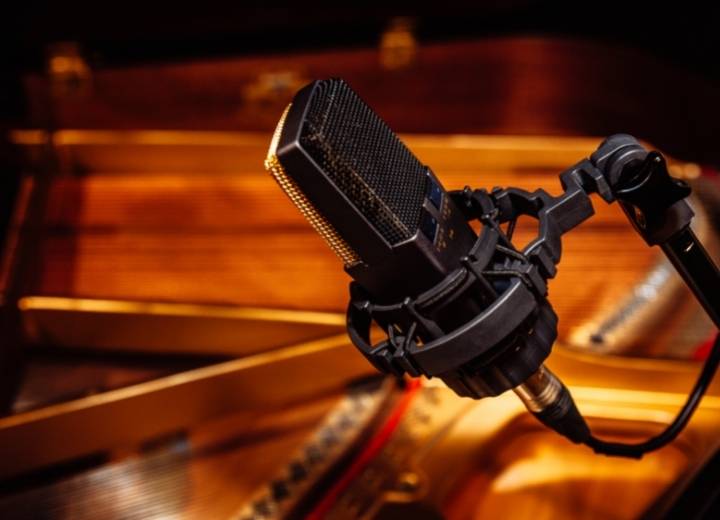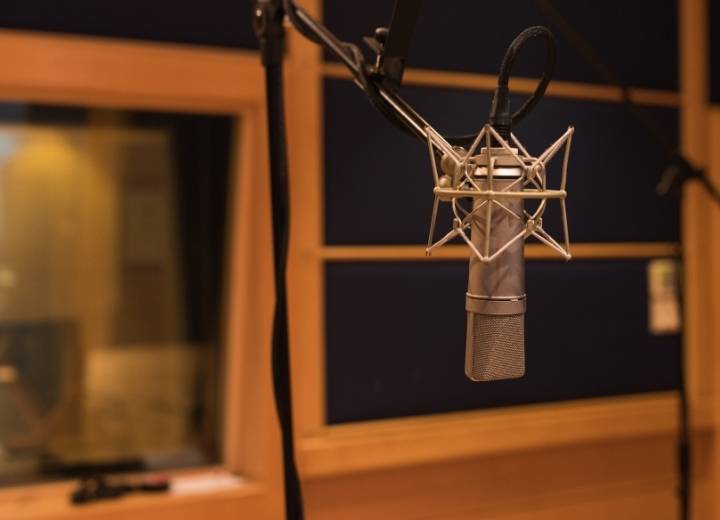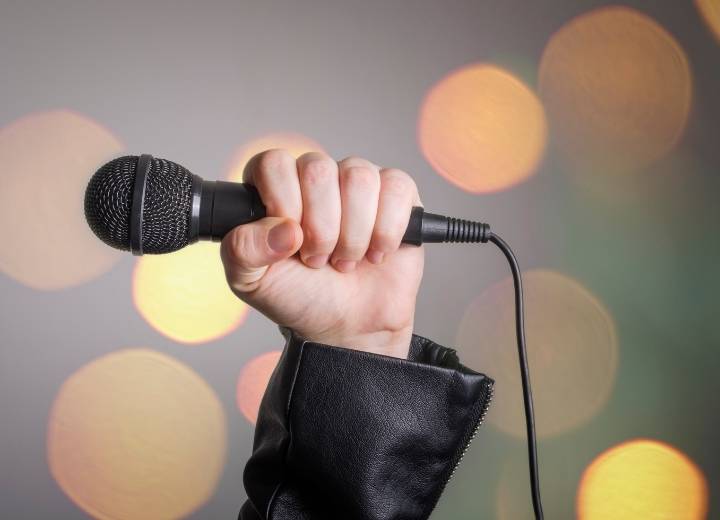
Is condenser mic good for karaoke? Unfortunately, you should not use condenser mics for home karaoke or live performances. Because this microphone type applies to vocal recordings rather than karaoke. If you sing over a condenser mic, the result wouldn’t please you.
What Is A Condenser Microphone?
We often see singers use a condenser microphone, or a capacitor mic, in studios due to its accuracy and detail. How can the mic achieve these advantages?
In particular, there’s a fixed plate inside a condenser mic, which suspends the lightweight diaphragm. Sound waves build up pressure against this diaphragm and cause it to move.
Due to the increased sensitivity and thin diaphragm, singers often use condenser mics to collect delicate, airy sounds.

These microphones need an adequate power source that comes in the form of phantom power. Typically, you can use a battery of 9v to operate it.
A capacitor mic is extremely good at capturing high frequencies and vocals. It can pick up drum overheads and acoustic guitars as well. That’s the reason it’s the preferred microphone type in most studios.
Is Condenser Mic Good For Karaoke?
The first thing to do when choosing a karaoke mic is to look at the type of mic.
A karaoke microphone should accommodate noises and echoes properly because karaoke sounds are a combination of instruments, drums, and vocals of all genres at high frequencies.
Can I use a condenser mic for karaoke? You don’t want to sing karaoke over such a sensitive capacitor mic. Instead, a dynamic mic will be a better choice for your home karaoke.
We’ll tell you the reasons in the below section!
#1. What Are Downsides To Singing Karaoke With A Condenser Mic?
A condenser microphone can pick up large amounts of sound over a tremendously great field and distance of vision. The problem is that it’ll collect any noise that occurs while recording, which is particularly worse for a home karaoke set.
For instance, if someone slams the door or a truck outside gives out its horn, your condenser mic is likely to pick it all up and feature on the result. How can you enjoy the performance to the fullest with those distracting noises?
In a word, a condenser mic will pick up almost anything as long as you place it at the right distance away from the sound source. That’s also the reason it can’t work sufficiently if the vocalist doesn’t put it up close to her mouth.
Plus, condenser mics can rarely handle louder sounds because of the thin diaphragm and the sensitive nature. So powerful sounds, like bass amplifiers – part of a powerful karaoke system – are not within their capabilities.
#2. Why Is Dynamic Mic Better For Karaoke?
Dynamic mics have borne the classic design of the tapered handle and the balled end for decades. These gadgets are robust, fairly affordable, and moisture-resistant.
Due to the proximity necessary for these mics to work, dynamic microphones are pretty difficult to record instruments in a studio. However, unlike condenser mics, they deal well with amplifiers and drums.

The most important thing is dynamic mics experts at louder environments and booming sounds.
Unlike a condenser, a dynamic amplifies signals collected by the diaphragm using a wire coil. Thus, the result coming from a dynamic mic will be lower than a condenser.
They can ‘noise cancel’ the surrounding noises, allowing your voice and other sound sources to come out without forcing you to shout.
Thanks to the ability to tackle louder sounds and the decreased sensitivity, dynamic microphones are a better option for a singer to pick when on live stages or singing karaoke.
Another reason for a dynamic’s advantage over a condenser regarding karaoke is its incredible toughness. While it’ll be a tragedy if you drop a condenser mic, a dynamic is less likely to break or incur any damage after a collision.
This type of microphone requires little maintenance. With reasonable care, it can last you for hundreds of performances.
Plus, a dynamic also doesn’t need phantom power or batteries to work, hence costing much less than a condenser. For home karaoke, many users would opt for a more affordable selection.
All in all, a condenser microphone is not the top choice when it comes to karaoke. It’s great for recording vocals in the post-production stages rather than in live performances.
Meanwhile, a dynamic microphone is more popular on-stage and in karaoke bars due to its rugged construction and noise resistance.
How To Choose The Right Microphone For Karaoke?
There’s a lot to talk about regarding picking a karaoke microphone that suits your demands and vocal best. In our opinion, you need to take five important factors into consideration when shopping.
- Usability
A good karaoke microphone should pose as few technical problems as possible when in use. Considering all other factors are equal, go for the simplest setup that will give feedback very quickly. The term ‘plug and play’ applies right to this case.
- Mic Frequency Response
Some models, like a stereotypical radio microphone, come with large diaphragms built to gather a lower frequency range, such as a bass drum, a bass guitar, or a deep male voice.
Meanwhile, the small capsule microphone or small diaphragm comes in place to pick up a higher range of frequencies, like a female voice, shimmering cymbals, or the bright notes of an acoustic guitar.
You’d better buy overhead microphones that can tackle an orchestra or a drum kit. These models are applicable to almost any level of frequency.
- Directionality of the Vocal mic
Another important thing to do is to determine the type of directional pattern, or a micro’s polar pattern, that fits your demands perfectly.
For most karaoke amateurs’ vocals, a more concentrated directional micro is the best option. The ideal polar pattern to look for should be a hypercardioid or a cardioid.
This polar type will help minimize ambient noise and room tone as it’s super good at collecting sounds within close proximity of the front of the microphone.
- Test the mic with your voice
Doing a microphone trial with a handful of micros from the music store is an essential step when wandering around for a karaoke mic purchase.
If you’re planning to buy a high-grade microphone, you should rent a few ones for a couple of hundred dollars overnight to figure out which micro is right for you.
- The high price is not always better
Actually, a good karaoke mic for your vocal doesn’t have to cost you an arm and a leg. The best one should be both affordable and functional.
After all, we aim to buy a microphone that can serve our karaoke purposes well at a reasonable price point, don’t we?
In a word, we advise you to go for the mic that makes your voice sound fantastic but also fits your budget.
Which Shure Microphone Is Best For Karaoke?
When singing karaoke to live listeners, your mic needs to be solid yet still able to deliver a faithful reproduction of your vocal. Also, it should come with a nice ‘presence’ while not adding any issue to the acoustic feedback.
Generally, a mic tends to suffer a lot of bangs and knocks when on-stage. A good microphone will have to survive all these situations.
As discussed, dynamic mics are best for this case. Our go-to recommendation for your home karaoke is the Shure SM58. This mic is one of the most popular names in Shure’s microphone line-up and also the most preferred choice among karaoke lovers.
The model is robust, and its dynamic capsule features a cool cardioid polar pickup pattern. Thanks to this pattern, SM58 can effectively remove loads of unwanted noises as well as ambiance from multiple directions.
The microphone also generates pronounced and precise vocals, often with a little top lift to add presence and crispness.
If you’re planning to buy microphones for your karaoke box, then you can grab various models as long as they’re robust dynamics.
However, if you want to buy karaoke mics that are specifically for your and your family’s voices, it’s better to check they fit all. Each one is different and suits some performers better than others.
Conclusion
A good microphone is an imperative part of your home karaoke theatre, decent speakers and karaoke machines aside. Indeed, singing over a wrong mic is like using a hammer to drive home a screw.
So, needless to say, it’s highly advisable to know which type of micro is best for karaoke purposes.
Is condenser mic good for karaoke? We don’t think so, and neither do you, right? Instead, you can opt for a dynamic microphone to rock the party with nice vocal output.
